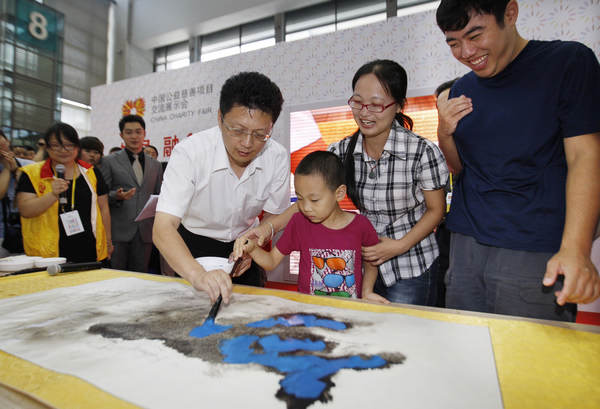
The government will no longer appoint individual charitable organizations as the exclusive recipients of donations for disaster relief operations after natural catastrophes, a senior official said on Friday.
The government will instead publish the ratings of charitable organizations as guidance for the public, Li Liguo, minister of civil affairs, said at a meeting in Shenzhen.
 |
|
Painter Xing Dong helps an autistic child with a painting in Shenzhen, Guangdong province, on Friday. China's first charity and welfare projects fair opened in the city, attracting 260 charity organizations, 104 foundations and 142 entrepreneurs. Qi Jieshuang / for China Daily |
The new moves will also include publishing the donation requirements of disaster-hit areas and updating the information at different stages of the disaster-relief process, he said.
The government will also facilitate public supervision of the fundraising and spending processes of the organizations to improve transparency levels, he said.
Wang Zhenyao, director of the One Foundation Philanthropy Research Institute at Beijing Normal University, praised the moves and called them "great progress". He said the measures will encourage more social organizations to participate in disaster relief efforts.
Given that social organizations were small and lacked skills in the 1990s, the central government usually only asked the Red Cross Society of China and the China Charity Federation to collect donations for emergency aid, said Wang, who used to head the social welfare and charities division of the Ministry of Civil Affairs.
In 2008, when a devastating earthquake hit Sichuan province in Southwest China, 13 public foundations were asked to raise money for the quake survivors, he recalled.
"The government has realized that disaster relief is not simply about giving food and rebuilding homes for the disaster-hit population. It's complicated work, and social organizations with different expertise levels should be encouraged to join the process," he said.
Also, to boost innovation in the social-work sector, the ministry will keep promoting its bottom-up reform of the social organizations' registration process by encouraging local civil affairs authorities to have more NGOs directly applying for registration, Li said.
Currently, 19 provinces and autonomous regions - including Guangdong, Anhui and Jiangsu - have tested direct registration policies. The policies allow certain types of social organizations to directly apply for registration without having to find a supervising department.
Under national laws and regulations, a social organization must be affiliated with a supervising department as a pre-condition for registration.
That requirement stopped many grassroots organizations from getting registered as it was often difficult to persuade an administrative department or influential institute to be their supervising body and take legal responsibility for their operations, said Deng Guosheng, a professor specializing in philanthropic studies at the School of Public Policy and Management with the Beijing-based Tsinghua University.
Statistics from the ministry show that there are 460,000 registered social organizations on the Chinese mainland.
Deng estimated that the number of unregistered NGOs exceeds 1 million.
Since March, the civil affairs bureau of Shenzhen piloted a direct registration policy that applies to eight types of social organizations in sectors such as philanthropy, education and culture.
Hou Yisha, deputy head of the Shenzhen civil affairs bureau, said that there are about 5,000 social organizations in Shenzhen, and that more than 700 organizations were directly registered.
Li said that his ministry will speed up the reform process to facilitate direct registration at the national level.
He also said that the government will promote the registration of international NGOs, without giving details.
hedan@chinadaily.com.cn







